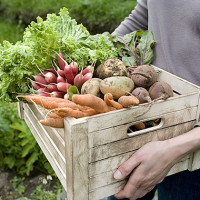
Out on Old Adobe Road, just on the way to Petaluma, there is a quaint little farm stand called Green String Farm. This unassuming farm is part of a local organization that is working to change the community from the ground up by promoting sustainability and staying local through their new internship program, the Green String Institute.
Green String Farm is the creation of two Sonoma businessmen, Fred Cline of Cline Cellars and Bob Cannard Jr. of Cannard Farms. According to Cannard, Green String Institute hopes to “help train local producers to find a niche in their own environment – helping producers compete in the local marketplace.” And by helping each other, local producers will be able to improve the immediate environment. That’s what it means to be “green string.” Cannard says the method is to “try to grow things in a symbiotic relationship with nature and improve the land as we take things off it. Half of what’s grown is for the land, and the other half for us.”
Cannard and Cline have been working together for the past seven years to transition the operations of Cline winery, and then Jacuzzi, to become sustainable. They’ve taken it to the next level by forming Green String Farm, and its offshoot instructional program, the Green String Institute, which extends to the community in order to teach a system of sustainability geared toward helping local producers go beyond organic.
Originally, Cannard was a large proponent of the organic foods movement, but became disconcerted by what it has become. Cannard commented, “The term ‘organic’ is now under the federal government, so it is subject to lobbying from corporate entities, and as a result, standards have been weakened to the point where the term is basically meaningless.”
In reality, the farming practices of some large-scale organic producers don’t follow the ideas of what organic was intended to mean – local, sustainable, and not disruptive to the environment.
The Green String Institute hopes to provide an alternative to common farming practices, although in some cases, Cannard’s practices are a surprise. Instead of neatly ordered rows of green, chaos seems to reign in the fields, with weeds poking through the plots of vegetables. Cannard’s son Ross, coordinator of the Green String Institute, explains the theory. “We work with the natural ecosystem that’s in place – improving biodiversity, and growing a superior product because of that. Growing in the midst of weeds and pests is a big part of it. Balanced and healthy surroundings provide a richer, healthier crop, and one of our goals is to provide the best, most nutritious food for the local population.”
Teaching is a natural transition for Bob Cannard, who for 23 years, served as an agricultural instructor at the Santa Rosa Junior College, where his father taught before him. Cannard taught many different classes, all geared toward “how to sustainably produce for the local marketplace,” a topic close to his heart, since he used to be on the board of the Sonoma County Farmer’s Markets and has also been a participating vendor on and off since 1978. At the Green String Institute, he expands on that theme during the work-intensive internship program.
Green String interns are involved in all the daily activities of the farm and receive instruction from Cannard along with guest instructors from local businesses. Topics for lessons are focussed on sustainable farming methods, but include a little of everything, from beekeeping with instructor Ross Rubin to sustainable business management with Fred Cline. They offer introductory courses in areas of soil and plant health as well as retail and marketing tips. The idea is that interns will get a well-rounded experience and can actually see what it takes to make small businesses work.
The goal is for interns to go out and practice what they’ve learned in their own projects. Intern Melissa Reeser from Santa Cruz has been hired for another term to help run the intern house on Green String Farm. Darci Pauser, who recently completed the program, hopes to start a sustainable urban garden in Oakland using the methods she has learned.
While the Green String Internship program is still in its infancy, all spots in the intern house are currently full. The next eight openings will be for the term beginning June 1. Anyone can apply, although good health is required for the intense three-month program, which consists of 35 hours of instructional time/work in exchange for food, lodging and a modest stipend. For the future, Ross Cannard says, “the goal is to eventually expand to other educational programs in order to increase community involvement.”
The Green String Institute wants to teach sustainable practices to more local producers in order to foster a new generation of farmers who share their desire “to continue to grow high-quality food while improving the land they steward.”
For more information about the Green String Institute, visit the Web site: www.greenstringinstitute.org.
Green String Farm is at 3571 Old Adobe Road, Petaluma, CA 94954. 707.778.7500.
www.greenstringfarm.org
Green String Institute teaches sustainable farming practices through new internship program
More from FeaturesMore posts in Features »






